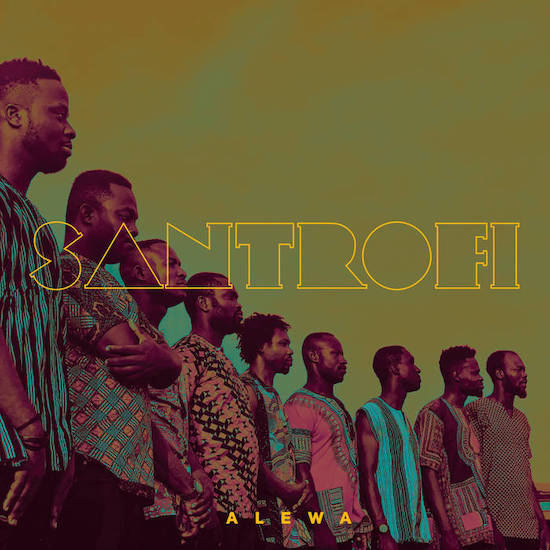As background calls to action among the group introduce the first track ‘Kokroko’ it is as though recreating a scene from one of the fabled nightclubs in Accra. Around the 1960s and ‘70s, big band highlife music in Ghana had a thriving scene, to the extent that most bars had their own resident live musicians – all playing their own original material. The song follows a style of call and response arrangement representing invocation, popular among the Akan tribe and part of the passing down of musical traditions down family lines of griot musicians over generations.
Members of Ghanaian highlife octet Santrofi have played with Ebo Taylor and Pat Thomas, who have themselves over more than half a century carved their own brand of highlife, Afro-funk and disco. Emmanuel Ofori, who plays bass and produced the album, formed the group after spells performing with both of the above and brings the heritage of the highlife form to the present day.
The name of the group comes from a mythological precious bird from the Akan language – noted for its bright colours and four wings. The santrofi was so unusual that hunting of it was prohibited and was said to bring bad luck. However, if you let it be free then luck and fortune was sure to follow. In Ghana, ‘Alewa’ is a popular humbug-like sweetie and is symbolic for representing acceptance of love, tolerance and unity.
Highlife musicians didn’t just look to traditional Ghanaian folk forms for inspiration. Based on the west coast of Africa, additional influences came from Portuguese, Spanish and Caribbean sailors who played music on their visits, ahead of the country’s independence in 1957. ‘Odo Maba’ most faithfully brings the sounds of the past alive for a ballroom setting, with trumpet and trombone horn section to the fore recalling an earlier period, the influence of 1940s big band jazz era on ‘high life’ music, and high living.
The subsequent evolution of these sounds combined, created a music that, during the ‘Golden Era’ prior to political upheaval in 1966, was not just popular in Ghana, but across Africa. Thanks to visitors like Fela Kuti and Hugh Masekela, elements of highlife were soon incorporated into new forms, of Afrobeat and jazz music, and heard across Africa and the wider world. Before then Kwame Asare had sailed to the UK to cut the first recordings of highlife music onto disc in 1928, ‘Yaa Amponsah’ for the Zonophone label. The track became a standard with numerous versions including one by E.T. Mensah in the following years.
The palm wine guitar playing that is an instantly familiar feature of the highlife sound, has a history of solo musicians continuing to play, for as long as the drinks flowed. Asare reportedly learned a two-finger technique of playing on a traditional harp-lute, the seprewa, from a Liberian seaman. As the template for the form expanded over the years to accommodate more musicians, so more styles of traditional music and musicians entered to establish groups, with distinctive funk and polyrhythmic drumming – all of which Santrofi adeptly combine into their faithful revival of the sound.
The Afro-funk of ‘Kwaa Kwaa’ evokes a traditional children’s game in the form of a lullaby to send babies to sleep, with the group deploying hypnotic bass and psychedelic guitars over polyrhythmic drumming. Album closer ‘Mobo’ features harmonised gospel singing – a style that became more prominent in the 1980s as nightclubs suffered during economic decline and the church moved to provide entertainment by hiring gospel highlife groups.
Over the last century, since Kwame Asare first translated the seprewa scales onto guitar, highlife has developed as Ghanaian groups have included influence of traditional folk styles from around their communities and beyond. On Alewa, Santrofi bring elements from different eras acknowledging the rich history of Ghanaian music into a cohesive and vital sound for the 21st century.


